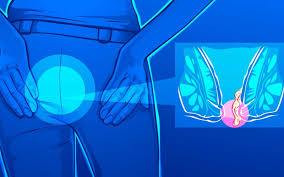Hemorrhoids are a common concern for many people, causing discomfort and inconvenience in daily life. These swollen and inflamed veins in the rectal or anal area can vary in intensity, from mild irritation to severe pain and bleeding. Individuals who experience symptoms often find themselves questioning how best to relieve these issues.
Understanding Hemorrhoids
Hemorrhoids, also referred to as piles, are a result of increased pressure in the lower rectum, which can occur due to factors such as straining during bowel movements, prolonged sitting, or pregnancy. They are classified into two main types. Internal hemorrhoids occur inside the rectum and can be painless, though they may cause rectal bleeding. External hemorrhoids, on the other hand, develop under the skin around the anus and may lead to significant discomfort, swelling, and itching.
Symptoms of hemorrhoids can vary widely. They may involve mild itching, while for others, they may include significant pain or the presence of a lump near the anus. They are generally classified as a non-severe condition.
Exploring Treatment Options
Finding relief from hemorrhoids may involve a combination of remedies. Treatments fall broadly into two categories: at-home remedies and professional medical interventions. Each approach has its strengths and limitations, depending on the severity of the condition and the individual’s preferences.
At-Home Remedies
For mild to moderate cases of hemorrhoids, at-home remedies can provide effective relief. These options aim to reduce symptoms such as swelling, pain, and itching while promoting healing. Some of these remedies include:
- Sitz Baths – Sitting in warm, shallow water for 20 minutes several times a day may soothe irritation.
- Fiber-Rich Diets – Increasing the intake of dietary fiber through whole grains, fruits, and vegetables can help soften stools and prevent straining during bowel movements.
- Over-the-Counter Products – Creams containing soothing agents, such as witch hazel, may temporarily ease pain and inflammation.
- Cold Compresses – Applying a cold pack to the affected area could help reduce swelling and provide localized relief.
Medical Treatments
While at-home remedies can often address mild cases, certain situations warrant professional medical treatments. These interventions are designed to provide more long-lasting relief or address severe cases where symptoms worsen or persist. These medical approaches include:
- Minimally Invasive Procedures
- Rubber Band Ligation: This procedure involves placing a rubber band around the base of an internal hemorrhoid to cut off its blood supply, causing it to shrink and fall off.
- Infrared Coagulation: This technique uses heat to seal and shrink hemorrhoids.
- Surgical Treatments
- Hemorrhoidectomy: This surgical procedure removes large or severe hemorrhoids and is often recommended for cases unresponsive to other treatments.
Contrasting Treatments
At-home remedies and medical treatments differ in their application, effectiveness, and the circumstances under which they may be used. For individuals with mild symptoms, at-home remedies provide a non-invasive and convenient way to manage discomfort. Incorporating lifestyle changes such as increased fiber consumption and staying hydrated not only helps with hemorrhoids but can also prevent recurrence.
For more severe cases, medical treatments offer targeted interventions. Rubber band ligation can bring substantial relief when over-the-counter products are no longer effective. On the other hand, surgical options like hemorrhoidectomy are typically recommended for advanced stages of the condition.
When to Seek Medical Assistance
If symptoms of hemorrhoids worsen or do not improve after several weeks of home treatment, it may be time to consult a healthcare professional. Signs such as intense or constant pain, significant bleeding, or the development of a hard lump may require a more comprehensive evaluation to rule out other conditions or complications. Hemorrhoids can significantly impact one’s quality of life, but a variety of effective treatment options exist.
- Integrating IV Therapy With Local Health Retreats for an Enhanced Wellness Experience in Temecula
- Recognizing the Symptoms of a Rotator Cuff Tear
- Tips for Managing Pain Post-Gallbladder Surgery
- How to Prepare for Your First Visit to a Dermatologist
- How a Pain Management Doctor Can Help Improve Your Quality of Life

Leave a Reply